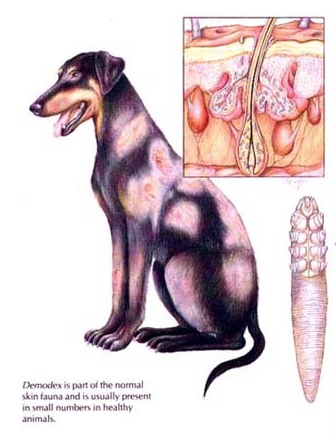Demodicosis is an inflammatory parasitic disease characterized by the presence of greater than normal numbers of demodex mites in the hair follicles and on the skin. The reason for this proliferation is poorly understood but a genetic defect in the T-cell portion of the immune system is suspected.
There are two forms of demodicosis:
Localized demodicosis lesions are typically characterized as focal areas (3 or less and in one region) of mild erythema (redness) with partial alopecia (hair loss) and variable amounts of scale. The most frequently affected areas of the body are the periocular (around the eye) and perioral (around the mouth) regions with the forelegs and the trunk as the second most common sites. Most localized demodicosis cases are mild and regress spontaneously; however, approximately 10% of cases will progress to the generalized form.
The generalized form is characterized as juvenile onset (dogs less than one year of age), adult onset, and pododemodicosis (affecting the paws). Generalized demodicosis can be quite severe and the lesions exhibit erythema (redness), alopecia (hair loss), crust formation, scale, and exudation. Pruritus (itchiness) is variable. Some dogs may have pododemodicosis (paws) only without involvement of other sites. Secondary pyoderma (bacterial infection) is a consistent feature of generalized demodicosis.

Treatment
Treatment of localized demodicosis is not always necessary as the majority of cases will spontaneously resolve. Treatment will not prevent progression to the generalized form. The general health status of the patient should be evaluated (ie. intestinal parasitism, diet, etc.) to ensure that underlying abnormalities or conditions do not contribute to the animal's predisposition to demodicosis. Topical therapy is frequently used for localized lesions.
Therapy for generalized demodicosis requires dedication over an extended period of time. In many cases, only control of the disease may be established rather than a complete cure or resolution. The following steps may be recommended for the treatment of generalized demodicosis:
Medical Therapy Options
LymDip (lime sulfur dip) - this protocol is the treatment of choice for cats (not dogs). Lime sulfur dips are very safe yet quite messy and malodorous. Cats must be prevented from licking the fur while wet from the dip as it may cause oral irritation.
Bravecto, Advantage Multi, etc.: the list of potential medications seems to change monthly
Prognosis
Prognosis depends on a number of factors including the severity of the condition, age of onset, duration of disease, and presence of underlying disease. Adult onset demodicosis is often difficult to treat and may require long-term therapy. It is recommended that affected young dogs be eliminated from the breeding population (castration / spay) to prevent any hereditary propensity.
Follow Up
Monthly or every-other-month recheck appointments are important to monitor the progress of the disease. It is essential to perform frequent skin scrapings and / or trichograms, as many dogs may look “cured” and still have mites that are microscopically visible. It is often recommended that the pet be treated for at least one month after a negative sample.
Contributed by: Karen Helton-Rhodes, DVM, Diplomate ACVD
Illustration reprinted with permission by the copyright owner, Hill’s Pet Nutrition, Inc.